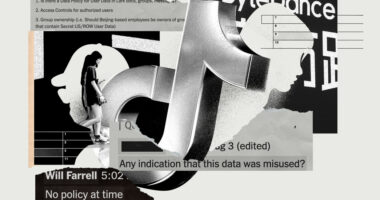
When the comedy screenwriter Lauryn Kahn first tried her hand at horror, a friend told her to write about the thing that scared her the most. She chose dating. After all, what’s more terrifying than relying on blind faith and a few Google searches to determine whether a complete stranger is a dud, a narcissist or, worse, a charming sociopath?
Kahn, 39, is now a married mother of two, but she can easily recall her single days (“It was quite a road,” she said with a laugh), and still grapples with the fear women carry as they go through life.
“I wanted to touch into that unspoken, subconscious way that we size up danger. ‘Do I have my phone? Where am I parked?’” she said. “Even when I’m walking my dog at night, my husband will be like, ‘Go ahead,’ and I’m like, ‘I don’t want to.’ No matter who’s behind me, it’s scary.”
Her uneasiness is taken to the ultimate extreme in the new film “Fresh,” starring Daisy Edgar-Jones (“Normal People”) as Noa, a singleton exhausted by the modern dating scene who shockingly finds romance IRL with the seemingly perfect Steve (played with spicy deliciousness by Sebastian Stan, who recently starred in Hulu’s “Pam and Tommy”). He turns out to be anything but. Telling you more would spoil the movie, but writing for The New York Times, the critic Amy Nicholson called it “a wickedly funny cannibal romance.”
That’s similar to what Kahn, who began her career as an assistant to director Adam McKay (“Don’t Look Up”), had in mind when she began writing the script three years ago. “I wanted it to start as a romantic dramedy, turn into a horror movie and then become a Quentin Tarantino film.”
None of that would have been possible had Mimi Cave, 38, not signed on to direct. “Fresh” represents her official arrival in Hollywood, a directorial debut so self-assured that The Times called it “dazzling.”
The producers McKay and Kevin Messick, who also oversees “Succession” and the coming HBO series “Winning Time,” spent months searching for the right director. They made the deliberate decision, along with Kahn, an executive producer on the film, to interview only female filmmakers. It’s a move that feels both appropriate for the material and also smartly defensive, an insurance policy of sorts against what could so easily go off the rails.
When you look at “the wrong way” to make a movie like “Fresh,” Messick said in an interview, “people can point to some films that have been made over the years that were directed by guys.” He wouldn’t name specific movies but said he was conscious that in an effort to walk the fine line between horror and comedy, the “Fresh” filmmakers would also need to ensure they weren’t exploitative while trying to comment on, for example, the blatant commodification of women.
“Why go down the same road?” he added.
For Cave, who is single, mining this world was no easy task. It took her months to finish reading the script, which didn’t hold back when describing Steve’s disturbing fetish. “There are certain scenes that are quite upsetting, so I had to put it down and then come back to it,” she said. “I was terrified of it.”
She also understood it at a base level, specifically the coded language Kahn inserted for female viewers that wouldn’t necessarily register with men, like when Noa is walking to her car with her keys in her hands for protection or when Steve says to her, “Stop being so dramatic.”
Those details kept gnawing at her. The script felt both personal and scary, a tightrope walk that would succeed or fail depending on how she handled the material. Cave’s pitch, Kahn said, relied heavily on sound and music over visual elements. It was a strategy that ultimately raised the scare factor without turning audiences off with gore. It also puts viewers squarely inside Noa’s perspective.
“Certain scenes were about knowing what was happening or imagining what was happening, but not actually seeing it, so you could then get into people’s psychologies a little bit,” Cave said. “The audience was then imagining whatever their worst fear was instead of telling them.”
And just when things get unbearable — when the toxic masculinity reaches its peak — Cave and Kahn interject comedy to save viewers from the darkness.
“I knew that was going to be the absolute hardest thing, the balance. There are only a handful of other movies that do this sort of comedy horror that aren’t pushing too far into campiness,” Cave said, citing “American Psycho” and “Get Out” as examples.
It was a risky strategy, Messick said, and he and his fellow producers had already run up against several roadblocks on their way to getting the film made. “People were scared of the script when we tried to sell it,” he said. “People were scared of the film when we were looking for a distributor.”
Ultimately, it is the execution that saves “Fresh” from its baser tendencies. That comes from Cave, whose confidence and drive belies her soft-spoken nature. She has spent the past decade working on music videos and commercials, utilizing her training as a dancer and choreographer to hustle for jobs in San Francisco and Los Angeles, all the while keeping her eyes on the ultimate goal of directing a feature. Now the offers are flooding in. Cave has committed to a new unannounced project that is in a similarly moderate budget range as “Fresh,” and she is trying to not get overwhelmed with all this newfound attention.
Khan has been toiling in Hollywood since her 20s. The screenwriter, with a thick New Jersey accent and a gregarious personality, began working for McKay just as he and Will Ferrell were starting their comedic shorts website, Funny or Die. Kahn wrote, directed and starred in some of those bits, but became something of a sensation in 2011 when Fox 2000 bought her spec script for $1 million.
“All of a sudden, she wasn’t an assistant anymore,” Messick said.
Khan went on to write the 2018 road-trip comedy “Ibiza” for Netflix before turning to “Fresh.” Now she is writing for other people’s projects and is closing in on her own original idea for a limited series.
How are Cave and Khan feeling about Hollywood’s treatment of women filmmakers?
“Before Covid, people kept saying it’s a great time for women, and I’m like, ‘Show me the money,’ because nothing had changed in my life. I was still hustling just as hard as I always have,” Cave said. “But with this last year, and I think in the pandemic, stuff did shift, and I do feel like the floodgates are open, a little.”
She points to the numbers out of this year’s Sundance where 55 percent of the features in the festival were directed by women. “I know, for a fact, that all these women have been working for years. And so it’s like, ‘Oh, finally someone paid attention.’”
Source: | This article originally belongs to Nytimes.com









